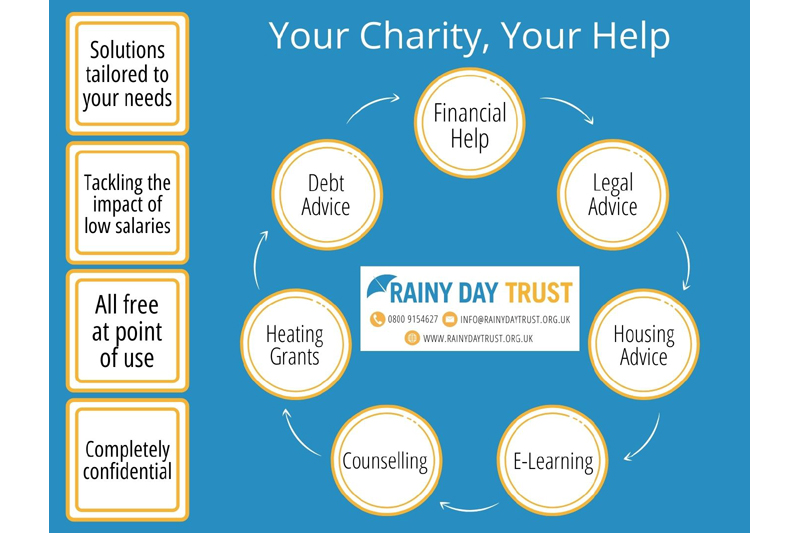
Writing in the September monthly bulletin from the Rainy Day Trust, the industry charity’s CEO Bryan Clover reflects on the challenges facing a growing number of individuals working within the sector.
Language is everything: As a junior pilot in the RAF, along with all of my officer colleagues, I had to undergo an 18-month writing course in preparation for being promoted. Among other things, it taught me about the five occasions when you are allowed to split an infinitive. Doing it deliberately for emphasis is one, so Captain Kirk can boldly go to his heart’s content. The course was useful in some ways, and mightily boring in others, but I most definitely understand the difference in meaning between ‘should’ and ‘must’. Interestingly, it also taught me to really analyse language and look for hidden meaning in what is written.
The language of those that ask us for help has been changing over the last few months. Towards the end of 2021, it was hopeful that we could help, but accepting that we might not be able to. Now it is very different. The tone is urgent, frightened even. If it were the spoken word, you would be able to hear the fear in the voice.
There is confusion too. How did this happen? How did it creep up on me? Of course, it didn’t creep up on anyone as the press has been talking about a cost-of-living crisis for months now, but many people have been assuming that it wouldn’t affect them. Because none of the previous crises did, why would this be any different?
And that leads me neatly into the next shift. This cost-of-living crisis, driven by double-digit inflation and rising utility bills is reaching higher into the employment ladder than anything that I have seen before.
Since I joined the Charity back in September 2015, the bulk of our applicants have been earning well below the average wage, in the ‘mid-teens’ as it were, part-time workers or were retired on small pensions. There were a few people that applied who earned a bit more, but they were in the minority.
Now it is very different.
We are receiving applications from people earning in the mid-high twenties. That is a significant change, but not one that should be surprising. Let’s say you earn £25,000 a year, that equates to a take home of about £1,709 a month. The average rent for a 3-bed property in Swindon is about £1,100 a month (I dare not look at London), utility bills another £300 a month, telephone bills, insurance, clothing and then there’s running a car, and food to put on the table.
Suddenly, that ‘comfortable’ £25,000 a year doesn’t look so comfortable after all.
So, all the news saying that gas and electricity prices could go up again in October by another £50-70 a month is terrifying for a vast number of people. The fact that our application rate has tripled since January bears witness to that fact.
This current set of economic problems is hitting everyone. Not long ago the papers were talking about high inflation affecting ‘millions of people’. Now they say ‘millions of us’. Before it was ‘them’, now it is ‘us’. Only one word has changed, but with it, the emphasis of that sentence is entirely different.
What point am I trying to make? It’s a simple one. The rules have changed. The boundaries have changed. We are almost in uncharted territory. Yes, the press is having a field day and whipping everything up into a frenzy, but the hard facts are there for all to see.
This crisis is very different and it is affecting an awful lot more of your colleagues that you might think.
Businesses in the home improvement sector have a stark choice. Sit back, do nothing and watch as your experienced staff look for a job elsewhere – and it’s a candidates’ market at the moment. Or …. you can work with us, allowing us to help them and in return you can retain your people and do the right thing. Where we engage with a business, the staff feel cared for and know that there is a safety net there.
How many of your competitors have contacted us already and are giving their businesses the edge? Just a thought. Over to you…
The Rainy Day Trust says it can ‘offer so much more than just financial assistance’, with a range of other support services for your staff including free debt advice, telephone counselling and an online welfare benefits checker (which last year identified £1.8 million in eligible benefits). It can also offer free support for your business to navigate the charity sector and identify other help for your teams in addition to providing advice and guidance for HR teams on subjects such as offering bereavement support.
The charity is looking for a number of local ‘Community Champions’ to become ambassadors at their workplace, making sure that colleagues know who the organisation is and how it can help them. It is not asking for caseworkers, merely individuals that can put up posters in staff areas, make sure HR teams have its range of leaflets and small info cards, and acting as a conduit for colleagues the RDT may be able to support.
Fundraising
Fundraising is vital for charities such as the Rainy Day Trust and, following on from his previous challenge, CEO Bryan Clover is about to embark on his latest fundraising endeavour – hiking 100km non-stop in 24 hours along the Thames Path. Bryan is raising money for the Charity’s energy saving campaign, supporting the provision of energy-saving devices such as LED lightbulbs, eco show heads and radiator reflectors to families that are struggling to pay their energy bills.
Taking place on 10th September, you can support Bryan on the Thames Path Ultra – 100km Non-stop challenge by donating here to his Just Giving page.
For more information on all of the charity’s activities, visit www.rainydaytrust.org.uk or email bryan@rainydaytrust.org.uk









